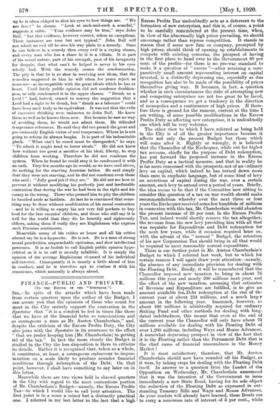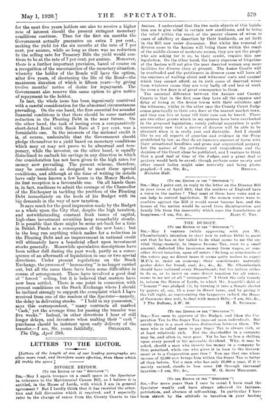FINANCE—PUBLIC AND PRIVATE. ET0 THE tDITOR OF THE EIPECTITOE2] SIR,—In
spite of the attacks which have been made from certain quarters upon the author of the Budget, I can assure you that the opinions of those who count for most in the City entirely support the contention in the Spectator that "it is a comfort to feel in times like these that we have at the financial helm so conscientious and so courageous a man as Mr. Austen Chamberlain," and, despite the criticism of the Excess Profits Duty, the City also joins with the Spectator in its assurance to the effect "that we prefer keeping him [Mr. Chamberlain] to getting rid of the tax." In fact the more closely the Budget is studied in the City the less disposition is there to criticize its details. Rather it is recognized that, taken as a whole, it constitutes, at least, a courageous endeavour to impose taxation on a scale likely to produce sounder financial conditions through redemption of the Debt. On that point, however, I shall have something to say later on in this letter.
Meanwhile there are two views held in shrewd quarters in the City with regard to the most contentious portion of Mr. Chamberlain's Budget—namely, the Excess Profits Tax—to which I would like to call your attention. The first point is in a sense a minor but a distinctly practical one. I referred in my last letter to the fact that a high Excess Profits Tax undoubtedly acts as a deterrent to the formation of new enterprises, and this is, of course, a point to be carefully remembered at the present time, when,
in view of the abnormally high prices prevailing, we should encourage rather than repress competition. It stands to reason that if some new firm or company, prompted by high prices, should think of opening up establishments to compete with existing concerns, the prospect of having in the first place to hand over to the Government 60 per cent, of the profits—for there is no pre-war standard to make it a question of "excess "—after retaining a com- paratively small amount representing interest on capital invested, is a distinctly depressing one, especially as due recognition has also to be made of the possibility of prices themselves giving way. It becomes, in fact, a question whether in such circumstances the risks of attempting new and competing enterprises are not too great to be faced, and as a consequence we get a tendency in the direction of monopolies and a continuance of high prices. If there- fore there is ground for the rumour, current at the time I am writing, of some possible modifications in the Excess Profits Duty as affecting new enterprises, it is undoubtedly one which will be very welcome.
The other view to which I have referred as being held in the City is of all the greater importance because it affects not only the present Budget but those which will come after it. Rightly or wrongly, it is believed that the Chancellor of the Exchequer, while out for higher tax revenue, ()hie), for the purpose of Debt redemption, has put forward the proposed increase in the Excess Profits. Duty as a tactical measure, and that in reality he is far more concerned with the prospects, not of an ordinary levy on capital, which indeed he has turned down more than once in emphatic language, but of some kind of levy on accretions of capital during the war, over a certain amount, such levy to extend over a period of years. Briefly, the idea seems to be that if the Committee now sitting to consider this question of a tax on war wealth should make recommendations whereby over the next three or four years the Exchequer received some few hundrieds of millions in connexion with this tax, Mr. Chamberlain would abandon the present increase of 20 per cent. in the Excess Profits Tax, and indeed would shortly remove the tax altogether, the revenue from the new levy providing him with all that was requisite for Expenditure and Debt redemption for the next few years, while if occasion required later on, with the advent of the " normal " Budget, the retention of his new Corporation Tax should bring in all that would be required to meet reasonably normal expenditure. There is one further point in Mr. Austen Chamberlain's Budget to which I referred last week, but to which for certain reasons I will again draw your attention—namely, the absence of any immediate provision for dealing with the Floating Debt. Briefly, it will be remembered that the Chancellor imposed new taxation to bring in about 76 millions this year and nearly 200 millions next year, and the effect of the new taxation, assuming that estimates of Revenue and Expenditure are fulfilled, is to give an amount available for. Debt redemption at the end of the current year of about 234 millions, and a much largt r amount in the following year. Inasmuch, however, as about 160 millions is admittedly required for ordinary Sinking Fund and other methods for dealing with long- dated indebtedness, this means that even at the end of the current year the Chancellor will only have about 70 millions available for dealing with his Floating Debt of over 1,200 millions, including Ways and Means Advances. A somewhat depressing prospect in view of the fact that it is the Floating rather than the Permanent Debt that is the chief cause of financial unsoundness in the Money Market !
It is most satisfactory, therefore, that Mr. Austen Chamberlain shonld now have rounded off his Budget, as it were, by taking steps for dealing with the Floating Debt itself. In answer to a question from the Leader of the Opposition on Wednesday, Mr. Chamberlain announced that it was the intention of the Government to issue immediately a new State Bond, having for its sole object the reduction of the Floating Debt as expressed in out- standing Treasury Bills and Ways and Means Advances. As your readers will already have learned, these Bonds a-re to carry a minimum rate of interest of 5 per cent., while for the next five years holders are also to receive a higher rate of interest should the present stringent monetary conditions continue. Thus for the first six months the Government actually guarantee an extra 2 per cent., making the yield for the six months at the rate of 7 per cent, per annum, while so long as there was no reduction in the selling rate for Treasury Bills the yield would con- tinue to be at the rate of 7 per cent. per annum. Moreover, there is a further important provision, based of course on a recognition of the uncertaintiea of the monetary situation, whereby, the holder of the Bonds will have the option, after five years, of shortening the life of the Bond—the Maximum duration of which is fifteen years—by giving twelve months' notice of desire for repayment. The Government also reserve this same option to give notice of repayment to the holden In fact, the whole issue has been ingeniously contrived with a careful consideration for the abnormal circumstances prevailing. On the one hand, the first essential for sounder financial Conditions is- that there should be some material reduction in the Floating Debt in the near future. On the other hand, the task of issuing even a comparatively short-dated Bond with Bank Rate at 7 per cent, was a formidable. one. In the interests of the national credit it is, of course, undesirable that the Government should pledge themselves to a yield based on monetary conditions which may or may not prove to be abnormal and tem- porary, while the investor, on the ether hand, is equally disinclined to embark his savings in any direction in which due consideration has not been. given to the high rates for money- now prevailing. The present scheme, therefore, may be considered as designed to meet, these special conditions, and although at the time of writing its details have only been known a few 'hours in the Money Market, its first reception is a favourable one. On all hands there is, in fact, readiness to admit the courage of the Chancellor of the Exchequer in tackling the problem of the Floating Debt immediately on the heels of his Budget with its big demands in the way of new taxation. It says much for the good impression made by the Budget as a whole upon the City that, despite the high taxation, and notwithstanding constant fresh issues of capital, high-class investment securities keep remarkably steady. It is possible that there might be some set-back for a time in British Funds as a consequence of the new loan ; but in the long run anything which. makes for a reduction in the Floating Debt and an improvement in national redit will ultimately have a beneficial effect upon investment stocks generally. Meanwhile speculative descriptions have been rather dull during the past week, partly as a conse- quence of an aftermath of liquidation in one or two special directions. Under present regulations on the Stock Exchange, the process of " hammering " is no longer carried out, but all the same there have been some difficulties in course of arrangement. These have involved a good deal of " forced " selling, but it is believed that matters have now been settled. There is one point in connexion with present conditions on the Stock Exchange where I should be inclined strongly to support the complaint which I have received from one of the readers of the Spectator—namely, the delay in delivering stocks. "I hold in. my possession," says this correspondent, "many contracts all marked 'Cash,' yet the average time for passing the transfer was five weeks." Indeed, in other directions I hear of still longer delays, and investors when making their " eash " purchases should be insistent upon early delivery of the transfer.—I am, Sir,, yours faithfully, ONLOOXER. The city,, April 29th.



































 Previous page
Previous page